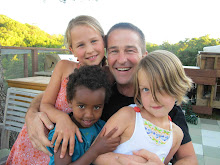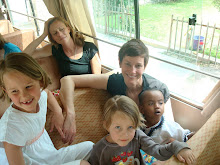I met Lorraine in grad school, and though I loved that creative writing program, I value her friendship more than my degree. She's a brilliant writer, someone whom I'll be proud to say I knew before the Nobel. Even better, she's an excellent friend, someone who loves to talk about the real stuff, the dark and the light. A sparkling mind inside delightfully fashionable wrappings.
We've always lived at least forty-five minutes apart so, especially since we had children, we need to make a point to see each other. We meet for dinner somewhere in between our homes at least every couple months. We used to meet at O'Chame in Berkeley, a hip, upscale Japanese place. Since I made the move to San Jose, we've taken to meeting in Fremont, an unlikely spot for a foodie rendezvous. We found what turned out to be an incredible Afghani restaurant. Some of the best food I've found anywhere. Surprising, but true.
At our last dinner, a couple months ago, I was in a particularly dark place. We were so clearly out of our element in San Jose, the work pressures on Ben were at such a pitch that we all felt enveloped in it and things weren' t going well with Mihiretu. There was a lot yelling in the house. Everyone was yelliing, Ben and me included. I was feeling frustrated and rather hopeless. I'm embarrassed to report that in that conversation with Lorraine, I said that Mihiretu could be "a real asshole" (half-kidding, but even so) and told her that we were thinking about bringing back the art of spanking.
A few days later, Lorraine called me. As delicately as she could, she told me many things I really didn't want to hear. That Mihiretu wasn't naughty, he just didn't know if he could trust me. That I sounded like I was in over my head and maybe I should get some help. Lorraine, I should mention, is the mother of a beautiful and charming four-year-old girl who has been diagnosed on the Autism spectrum. Lorraine, in listening to my tirade, recognized herself in the early days of Kiki's treatment. She heard the anger, the sadness, the misunderstanding that comes with parenting a child with challenging behaviors.
I listened as best I could. I didn't say much. I couldn't. I dropped a few tears as I sat with the phone to my ear and the kids circling and screaming. It was so hard to hear criticism of my parenting, a category in which I've always prided myself. Even harder because I knew it was true.
Immediately, Ben and I enacted a moratorium on yelling. My perspective widened and I was able again to see at least part of the larger picture instead of the tiny beam I had been stuck in. I called my social worker. And a few weeks ago, we had our first session of P.C.I.T.
P.C.I.T. is Parent-Child-Interactive-Therapy. The basic premise being that by praising the behaviors you want your child to continue and ignoring the ones you don't, you encourage a deeper bond. In play therapy, the parent practices the tools. They include general praise ("Good job!"), labeled praise ("Good job putting those legos together!"), description ("And now you're putting the blue lego on the green lego."), reflection (Mihiretu says, "Lego goes up" and I say "The lego is going up!") and enthusiasm ("Wow, legos!!"). All these elements should work to help the child and parent attach and to foster an atmosphere of cooperation.
I sit in a small room with Mihiretu for an hour, playing with him, wearing an earpiece. The therapist sits behind a one-way mirror and gives me prompts. "Say, 'Oh, thank you, Mihiretu, for sitting in your chair so nicely'" and when I manage to praise him well on my own, I get, "Oh, Liz, that was such nice labeled praise." Once, when I was feeling feisty, I said, "Oh, Ruth, such nice labeled praise of my labeled praise!"
It's easy to ridicule therapy talk. Ben, in a past relationship, logged some time in couples therapy. Every time we have an argument, he mirrors me. "I hear, Liz, that you feel unappreciated when I don't thank you for making dinner." It drives me crazy. Particularly when he wants me to mirror him. I feel trapped in therapy land, boxed in by rules.
But the thing is, as cold as these rules can sometimes feel, they work. Ben and I really do communicate better when we know that the other one is hearing what we're saying. And Mihiretu blossoms under praise. I find myself tearing up when the therapist tells me what a good job I'm doing with him. How we've come so far and our prospects are so bright. I know she says this to everyone. I know she's practicing the method. But I still feel myself buoyed by her affirmations.
My mother was a supreme nurturer. It might have been a slightly different story for my siblings, but by the time she got to me, nine years after her previous child, she was nothing but positive. She was always telling me how bright I was, how kind, how good I was at everything I attempted. Even now, in the late stages of Alzheimers, the first thing out of her mouth when she sees me is how beautiful I look. She can't remember my name but she can remember to praise me.
She rarely yelled. She slapped me only once, on the wrist, when she caught me playing with a sharp knife. The worst thing she had to say when I misbehaved (which, no surprise, given my kind treatment, was almost never) was that she was disappointed in me. At which point I'd run to my room and cry for hours.
One would think that with a model like this, my parenting style would be hyper-nurture. And I do a lot of nurturing, on my own, without prompting. But the pressures just now are huge. A brand new town that doesn't feel like a fit. Three small children. And the smallest of these young children doing everything he can to test me. Sometimes, quite simply, I fail the test.
We fight valiantly to keep things positive with the kids these days. I try to remind myself that I'm the adult in the situation and I should act like it. And already, things feel different with Mihiretu. When I used to imagine our shared future, I saw myself visiting him at the state penitentary. These days, the path seems clear towards a whole, happy, adult Mihiretu. And a relationship between us that is not only of necessity but also of love.
Sunday, April 4, 2010
Subscribe to:
Post Comments (Atom)






































I just love this post. I mean, it's not all shiny and happy, but it is REAL and in the end it is so very full of hope and strength.
ReplyDeleteI know it's awful to ever imply that our adopted kids should be grateful - after all, no kid should have to feel gratitude for having a family. But I do think Mihiretu is lucky for having found THIS family, and specifically - you.
Can you imagine if he had ended up in a home where his mother was not so insightful, compassionate, smart, and steadfast? He would be lost and a family would be broken. Instead, he is going to thrive, and your family will be richer than you ever would have been without him. And that's probably why he ended up with you.
Having watched you evolve in parenting, I think you are fantastic at seeking help, applying the help and finding your own way within it.
ReplyDeleteI also think that you can be V hard on yourself- and sometimes the volume is compounded by your own criticism. I wonder if there's a small funny way you might give yourself some labeled praise. maybe mirror back to yourself.